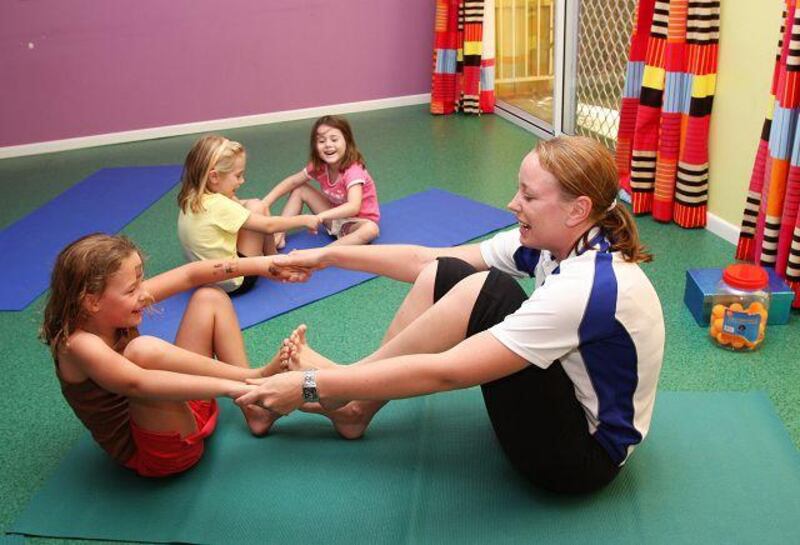BRISBANE // Stressed-out Australian children as young as two are being taught relaxation and yoga techniques at special classes in the Queensland city of Brisbane. Instructors said toddlers are feeling the effects of hectic lifestyles that can leave youngsters anxious and tense, causing them to become withdrawn, suffer from a lack of sleep and have poor levels of concentration. "The classes comprise yoga-style stretches, massage, breathing exercises, guided relaxations and visualisations and we finish with an affirmation card that the children take home with them," said Trish Riordan, who cofounded Calm for Kids, thought to be the only one of its type in Australia. The cards contain positive statements that reinforce the core principles that the lessons seek to imprint on sensitive minds, including the messages "I am safe", "I feel happy" and "I can be whatever I want to be". It all takes place at a suburban child centre in Brisbane, where a group of young Australians is being taught how to ease away the stresses of their lives as soft music fills the air and yoga mats are spread over the floor, while an instructor gently guides her charges through the 45-minute session. "Children are so busy, parents are so busy," said Mrs Riordan, 35. "Many children go to after-school care, before-school care; they go to school and they go to activities. A lot of them have two parents working full time and they don't get that time to just relax because their parents are busy as well. A lot of the time they relax at home in front of the TV." Such a lifestyle, she said, does not teach kids "how to just be still and be at one with themselves". The relaxation programme began in October and has proved to be popular with parents looking for help dealing with uptight and overactive offspring. Kerry Perrins is convinced her eight-year-old daughter has reaped the benefits. "Georgia has had some anxiety issues, so we brought her along just to teach her to relax," said Mrs Perrins, a mother of two. "She wouldn't go out of the house because she was scared of dogs, she was worried about storms and people dying. It really was affecting her life and all of our lives quite dramatically and it's improved out of sight." Another enthusiastic supporter of the Calm for Kids approach is Nicole Cunningham, who has seen changes in the behaviour of her daughters, ages four and six. "Priya has a general anxiety disorder, so she finds it very difficult to calm down and this helps her with her breathing; this helps her try to fall asleep at night because she's constantly worrying about things," Mrs Cunningham said. "And the younger one gets very angry and finds it very difficult to stop herself from getting angry whereas this helps them to calm down and helps them realise that they have a special place in the world." As well-liked as the courses are by parents, they certainly seem to be enjoyed by the children. "We've been resting and doing some postures. I think my favourite one was the dolphin fin. You have to get down on your knees then bring your hands up and put them up behind your back," said Priya Cunningham, six. "It makes me feel nice and calm and relaxed." At the end of the class, the room is a picture of tranquillity, where the children lie still on their mats, heads resting on pillows and their eyes shielded from the light by sleeping masks while Alison Sykes, the instructor, gently reads them a therapeutic story. Leah Bailey, 28, another co-owner of the Calm for Kids project, said she believes the courses will make a difference to troubled youngsters, but progress can take time. "It is not an overnight cure. It's something that needs to be learned," she said. But what about sceptics who will not be persuaded that such relaxation therapy is necessary and who believe that the stresses and strains that children feel are just part of growing up? "In part, that's probably true," Mrs Bailey said. "There are certain developmental stages where the same behaviour is going to be presented at certain stages with a lot of children. But I say why not help them through that and give them tools at a young age to deal with that rather than waiting until they're older and they've got a severe mental illness? I just think that the earlier you get to them, the better and if a three-year-old can learn to calm himself down, rather than be forced to by his parents, then that's a great gift you can give your children." pmercer@thenational.ae
Little ones saved from the stresses in their lives
Australian youngsters, caught up in the same hectic lifestyle as their parents, learn 'how to just be still and be at one with themselves'

Editor's picks
More from the national




